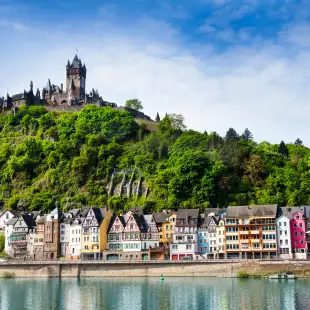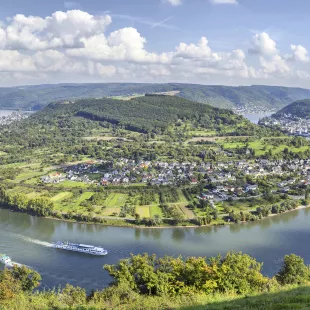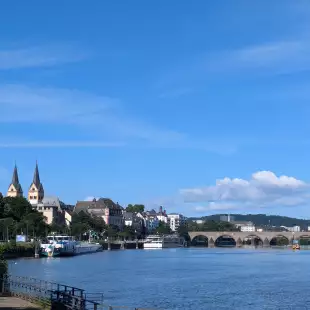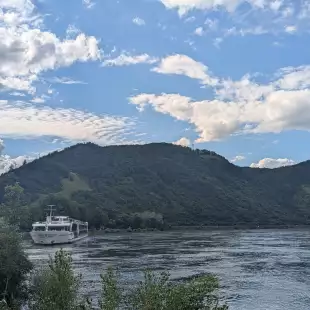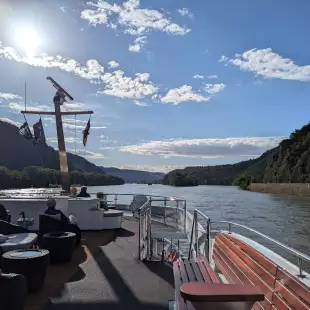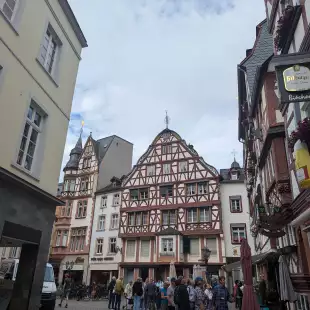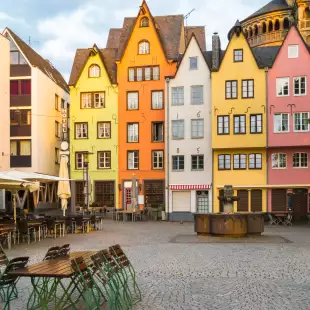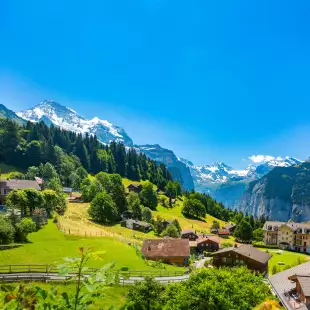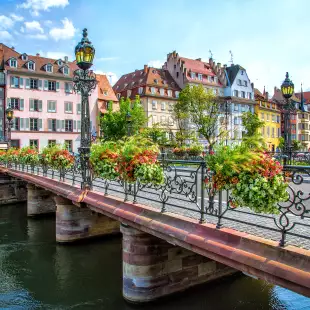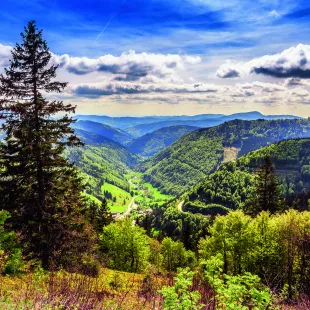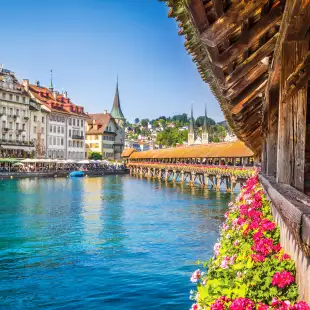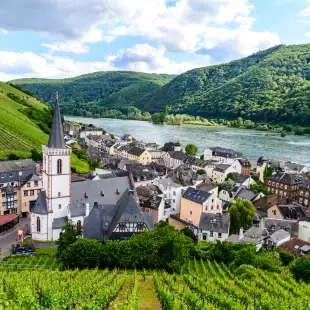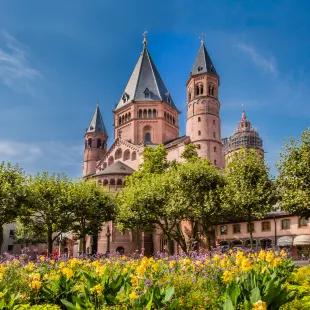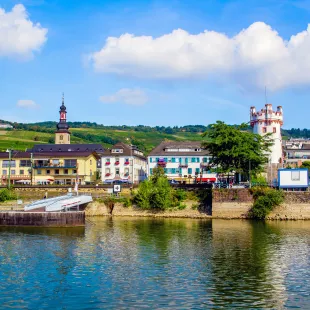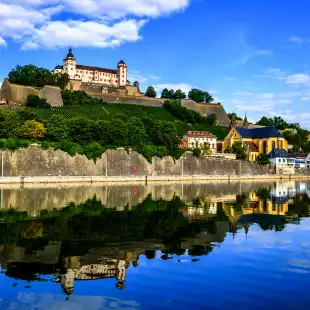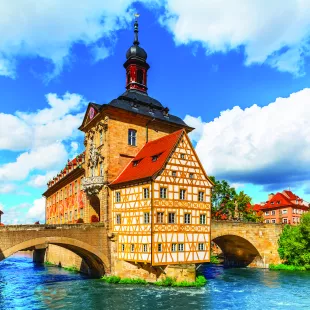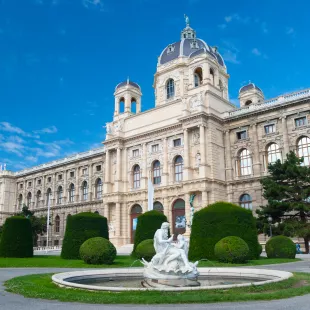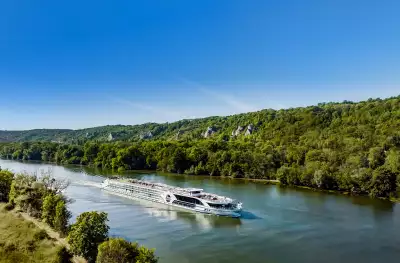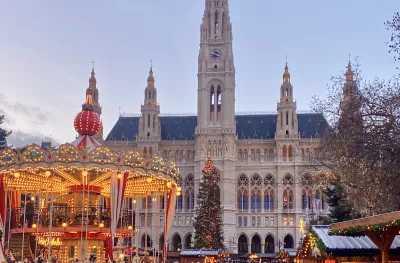Guide to the Best Castles on the Rhine
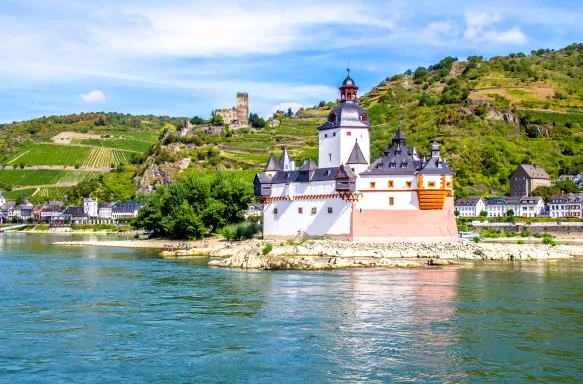
Expert advice on Rhine castle tours including opening times, entry costs and guided tour details. Explore some of the best castles in Europe and marvel at medieval architecture and learn about their rich history.
Embark on a journey along the Rhine and you’ll quickly discover the delights of one of the best river cruises in Europe. Dramatic castles and fortresses, many sitting aloft steep cliffs, line both banks of the river – a photogenic reminder of the river’s historic past.
Castles on the Rhine were mainly built between the 12th and 14th Centuries as defence strongholds and toll houses – and over 40 punctuate the landscape on just one 65km stretch of the Middle Rhine Valley. However, it was the later Romanticism period that influenced many 19th-Century makeovers. Some castles today are fine examples of these restorations, others are impressive ruins – here are some of our favourites.
What Are The Best Castles On The Rhine?
Marksburg Castle
If you can visit just one castle while enjoying a cruise on the Rhine river, make sure it’s Marksburg. It’s the only hilltop fortress that has never been destroyed and one of the best castles in Europe. Sitting majestically above Braubach and easily accessible from Koblenz, Marksburg looks as magnificent today as it did back in the 13th Century when it was built in a Romanesque style by the powerful Eppstein family. Striking Gothic buildings were later added when the castle was bought by a count belonging to one of the wealthiest lineages in the Rhineland. Over the centuries, Marksburg has been a state prison and living quarters for Prussian soldiers. Today, it’s the headquarters of the German Castles Association.
Castle highlights include the Great Battery, which houses cannons that aim out over the Rhine, as well as the kitchen and herb garden, Great Hall, bed chamber, armoury and wine cellar. Visit the small chapel dedicated to Saint Mark to view the exquisitely painted ceilings and walls. Guided tours are among the best castle tours in Europe.
Open: all year except 24 and 25 December. Summer season 10am-5pm (English tours lasting 50 minutes start at 1pm and 4pm). Winter season 11am-4pm (German tours every hour on the hour, English leaflet provided).
Adult entrance: €7
https://www.marksburg.de/en/
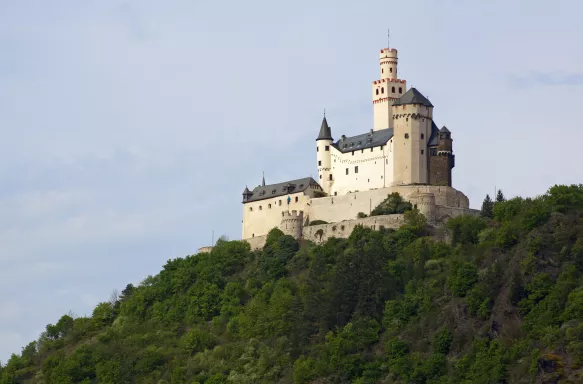
Rheinfels Castle
Rheinfels is another impressive castle on the Rhine, but unlike Marksburg, all visitors see here are ruins. They are spectacular though, and well worth a detour if you’re near St Goar. Once the mightiest of Rhine fortresses, Rheinfels was built in 1245 by a German count and given a Renaissance makeover during the 15th Century. Having withstood the onslaught of several strong armies, including French troops sent by Louis XIV in 1692, it was destroyed a century later, when the French revolutionary army blew up the building and exterior walls.
Rheinfels today is the largest castle ruins on the Rhine, with a labyrinth of tunnels and underground mines. Bring a torch for the guided tour and be aware there’s challenging terrain. You’re free to explore the grounds on your own, imagining the great towers, fortifications and grand halls (look out too for two other castles over the German river, Burg Katz and Burg Maus). Tours bring the history of Rheinfels to life, as does time spent in the informative castle museum.
Open: March-November, 9am-5pm (6pm during summer season). Regular guided tours last an hour.
Adult entrance: €5 (cash only)
https://www.st-goar.de/de/burgruine-rheinfels/
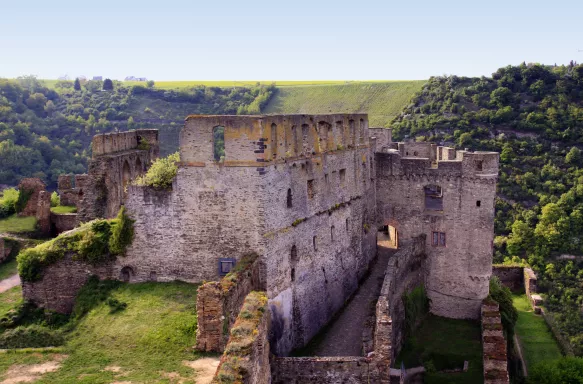
Heidelberg Palace
Although the historical town of Heidelberg sits on the banks of the river Neckar, it’s often included on the itinerary of a Rhine cruise, which is fortunate as the romantic Heidelberg castle was once upon a time one of the grandest palaces of the Renaissance. Constructed around 1300CE, it became a royal residence for Prince Elector Ruprecht III in the 15th Century, continuing to fulfil this role until the late 17th Century when it was destroyed by the French in the War of the Grand Alliance. A lightning storm, later in 1764, caused the palace to go up in flames, leaving it permanently uninhabitable.
While ruins are only visible today, Heidelberg Palace is still a popular tourist attraction, as are the castle’s extensive gardens which were regarded as a masterpiece of their time, having large fish ponds, waterfalls, mazes, arbours and orange trees. Three times a year, on a Saturday in June, July and September, the castle puts on an amazing firework display, to commemorate the wars and Mother Nature’s wrath.
Open: all year except 25 December, 8am-6pm. Summer season guided tours in English, Monday-Friday 11.15am and every hour until 4.15pm, Saturday and Sunday from 10.15am. Winter season, Monday-Friday 11.15am, 12.15pm, 2.15pm and 4.15pm, Saturday and Sunday additional tours at 10.15am, 1.15pm and 3.15pm.
Adult entrance: €8
https://www.schloss-heidelberg.de/en/home/
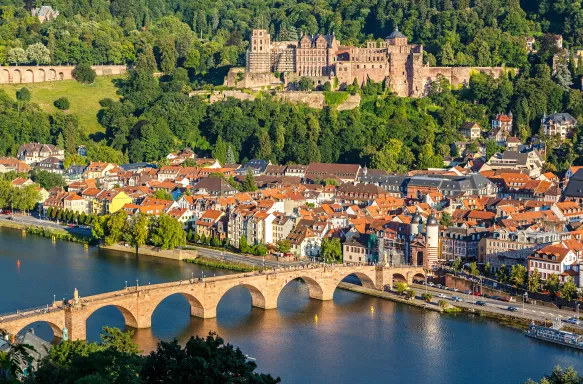
Reichenstein Castle
One of the castles on the UNESCO World Heritage Site of the Upper Middle Rhine Valley, Reichenstein is thought to date back to the 11th Century and has been the dwelling place of German lords, churchmen and robber knights, the latter who charged extortionate and often illegal toll fees from anyone travelling in the Rhine valley. Over the centuries, parts of Reichestein Castle have been attacked, burnt down, rebuilt and restored – and a resident apparently beheaded – with neo-Gothic additions being the work of the Kirsch-Puricellis, an industrialist family who took ownership in 1899 and who are still responsible for the property today.
An interesting excursion if near Trechtingshausen in Germany on a river cruise in Europe, visitors to Reichenstein Castle can explore a fascinating museum, home to a remarkable collection of ancient weapons, armoury and hunting trophies, and enjoy breathtaking views of the Rhine river below. There’s a castle hotel too. The neighbouring 13th-Century Rheinstein Castle, rebuilt in the spirit of Rhine Romanticism during the 1800s, is also worth a visit if time allows.
Open: Tuesday-Sunday, 10am-6pm.
Adult entrance: €6.50
https://www.burg-reichenstein.com/en/
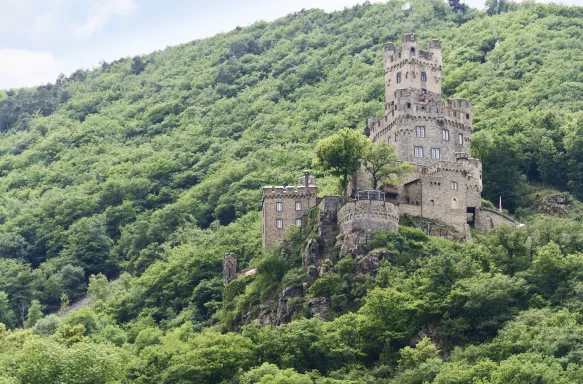
Stolzenfels Castle
One of the most romantic castles on the Rhine is Schloss Stolzenfels, surrounded by forest and high on a hilltop near Koblenz, the ancient city that is often referred to as the gateway to the Rhine Gorge castles. Stolzenfels Castle itself is a beautiful example of Prussian Rhine Romanticism architecture, having been transformed in the 19th Century by Crown-Prince Frederick William of Prussia. The young royal must have been taken aback when he received the somewhat unusual gift of medieval castle ruins from the people of Koblenz, but after he became king, Stolzenfels became his Rhine summer residence.
The only way to visit Stolzenfels is on a guided tour and examining the castle’s luxurious woodwork interiors are a highlight – you may be asked to wear protective slippers over your shoes. Also allow time to appreciate the wonderful gatehouse entrance, the frescos in the small knights’ hall, the chapel, the views across the Rhine river below (it’s quite a steep climb up to the castle), and the five spectacular gardens within the castle walls.
Open: summer season Tuesday-Sunday, 10am-6pm. Winter season Saturday, Sunday and public holidays, 10am-5pm. Tours are in German only, English booklet available.
Adult entrance: €5
http://www.schloss-stolzenfels.de/
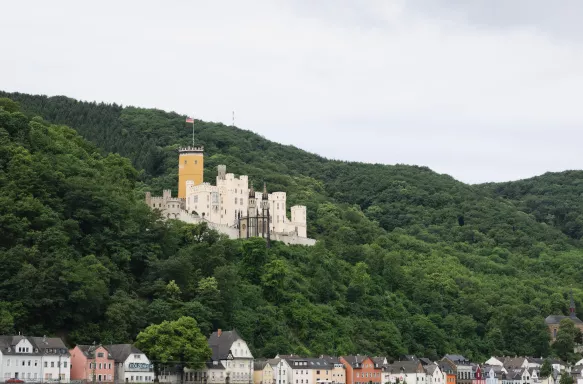
Pfalzgrafenstein Castle
Of all the castles found along the Rhine, Pfalzgrafenstein Castle must be one of the most picturesque. Perched on the island of Pflaz, Rhine cruises often pass the medieval customs castle, recognisable by its white walls, red brickwork and black pentagonal tower. Built in 1327 by King Ludwig the Bavarian, much of Pflazgrafenstein Castle still dates back to this time, although some modernisation took place in the early 17th Century and mid-18th Century – and flood and ice damage has meant regular masonry and foundation repairs. The castle, however, has never been conquered or destroyed.
Interestingly, although Pflazgrafenstein was a toll castle, ships were unable to dock there, so the job of the officials was to spy on passing vessels and act as trumpeter, alerting the nearby customs office in Kaub. Now a museum, visitors have access via a ferry service from Kaub, but note there are no modern facilities such as electricity or toilets. Audio guides (€1) provide informative details about the history and significance of the castle and are available in English.
Open: summer season Tuesday-Sunday and public holidays, 10am-6pm. Winter season Saturday, Sunday and public holidays, 10am-5pm.
Adult entrance: €7 includes ferry

Seeing the many imposing castles on the Rhine first-hand is an enticing reason to book a Rhine River cruise. But don’t just look from a distance, make sure you go ashore and spend time exploring these wonderful attractions – you won’t be disappointed with castles along the Rhine River cruise. If you have any questions, please do not hesitate to contact us.

